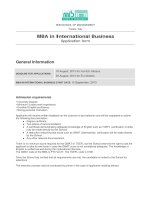Chapter 4: Ethics in International Business
Bạn đang xem bản rút gọn của tài liệu. Xem và tải ngay bản đầy đủ của tài liệu tại đây (228.42 KB, 48 trang )
Global Business Today 6e
by Charles W.L. Hill
McGraw-Hill/Irwin
Copyright © 2009 by The McGraw-Hill
Companies, Inc. All rights reserved.
Chapter 4
Ethics in
International Business
Introduction
Ethics refers to accepted principles of
right or wrong that govern the conduct of
a person, the members of a profession,
or the actions of an organization
Business ethics are the accepted
principles of right or wrong governing the
conduct of business people
Ethical strategy is a strategy, or course of
action, that does not violate these
accepted principles
4-3
Ethical Issues in
International Business
The most common ethical issues in
business involve
employment practices
human rights
environmental regulations
corruption
the moral obligation of multinational
companies
4-4
Employment Practices
Question: When work conditions in a host
nations are clearly inferior to those in a
multinational’s home nation, what
standards should be applied?
The standards of the home nation?
The standards of the host nation?
Something in between?
4-5
Human Rights
Question: What is the responsibility of a
foreign multinational when operating in a
country where basic human rights are not
respected?
Basic human rights taken for granted in
the developed world such as freedom of
association, freedom of speech, freedom
of assembly, freedom of movement, and
so on, are by no means universally
accepted
4-6
Environmental Pollution
Question: Should a multinational feel free
to pollute in a developing nation if doing
so does not violate laws?
When environmental regulations in host
nations are far inferior to those in the
home nation, ethical issues arise
The tragedy of the commons occurs
when a resource held in common by all,
but owned by no one, is overused by
individuals resulting in its degradation
4-7
Classroom Performance System
Multinational companies are concerned
with ethics is all of the following areas
except
a) Employment practices
b) Human rights
c) Environmental regulations
d) Trade regulations
4-8
Corruption
Question: Is it ethical to make payments to
government officials to secure business?
In the United States, the Foreign Corrupt
Practices Act outlawed the practice of paying
bribes to foreign government officials in order to
gain business
The Convention on Combating Bribery of
Foreign Public Officials in International Business
Transactions adopted by the Organization for
Economic Cooperation and Development
(OECD) obliges member states to make the
bribery of foreign public officials a criminal
offense
4-9
Corruption
Some economists suggest that the practice of
giving bribes might be the price that must be
paid to do a greater good
In countries where preexisting political
structures distort or limit the workings of the
market mechanism, corruption in the form of
black-marketeering, smuggling, and side
payments to government bureaucrats to
“speed up” approval for business investments
may actually enhance welfare
However, other economists have argued that
corruption reduces the returns on business
investment and leads to low economic growth
4-10
Moral Obligations
Question: Do multinationals have a
responsibility to give back to the societies that
enable them to grow and prosper?
The concept of social responsibility refers to the
idea that business people should take the social
consequences of economic actions into account
when making business decisions, and that there
should be a presumption in favor of decisions
that have both good economic and good social
consequences
4-11
Ethical Dilemmas
Managers often face situations where the
appropriate course of action is not clear
Ethical dilemmas are situations in which
none of the available alternatives seems
ethically acceptable
They exist because real world decisions
are complex, difficult to frame, and
involve various consequences that are
difficult to quantify
4-12
The Roots of Unethical Behavior
Question: Why do managers behave in
an unethical manner?
Managerial behavior is influenced by
Personal ethics
Decision making processes
Organizational culture
Unrealistic performance expectations
Leadership
4-13
The Roots of Unethical Behavior
Determinants of Ethical Behavior
4-14
Personal Ethics
Business ethics reflect personal ethics
(the generally accepted principles of right
and wrong governing the conduct of
individuals)
Expatriates may face pressure to violate
their personal ethics because they are
away from their ordinary social context
and supporting culture, and they are
psychologically and geographically
distant from the parent company
4-15
Decision Making Processes
Studies show that business people may
behave unethically because they fail to
ask the relevant question—is this
decision or action ethical?
Decisions are made based on
economic logic, without consideration
for ethics
4-16
Organizational Culture
Unethical behavior may exist in firms
with an organization culture (the values
and norms that are shared among
employees of an organization) that does
not emphasize business ethics
Values and norms shape the culture of
a firm, and that culture influences
decision making
4-17
Unrealistic Performance
Expectations
Pressure from the parent company to
meet performance goals that are
unrealistic, and can only be attained by
cutting corners or acting in an unethical
manner can cause unethical behavior
4-18
Leadership
If a firms leaders fail to act in an ethical
manner, other employees may not act
ethically
Actions speak louder than words
4-19
Classroom Performance System
Which of the following does not contribute
to unethical behavior by managers?
a) Unrealistic performance goals
b) Leadership
c) Organizational culture
d) Restrictions on bribes
4-20
Philosophical Approaches to Ethics
There are several approaches to business
ethics including
Straw men
The Friedman doctrine
Cultural relativism
The righteous moralist
The naïve immoralist
Utilitarian and Kantian
Rights theories
Justice Theories
4-21
Straw Men
Straw men approaches to business ethics are
raised by business ethics scholars primarily for
the purpose of demonstrating that they offer
inappropriate guidelines for ethical decision
making in a multinational enterprise
Four such approaches are
the Friedman doctrine
cultural relativism
the righteous moralist
the naïve immoralist
4-22
Straw Men
The Friedman Doctrine
Economist’s Milton Friedman’s suggests
that the only social responsibility of
business is to increase profits, so long as
the company stays within the rules of law
Friedman does not believe that
companies should undertake
expenditures beyond those mandated
by law and those required for the
efficient running of a business
4-23
Straw Men
Cultural Relativism
Cultural relativism is the belief that ethics
are culturally determined and that firms
should adopt the ethics of the cultures in
which they operate
“when in Rome, do as the Romans do”
4-24
Straw Men
The Righteous Moralist
The righteous moralist claims that a
multinational’s home country standards
of ethics are the appropriate ones for
companies to follow in foreign countries
This approach is common among
managers from developed countries
4-25









